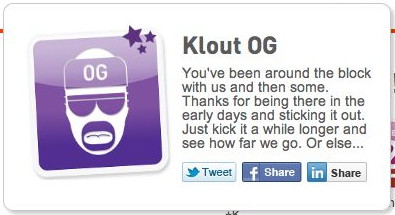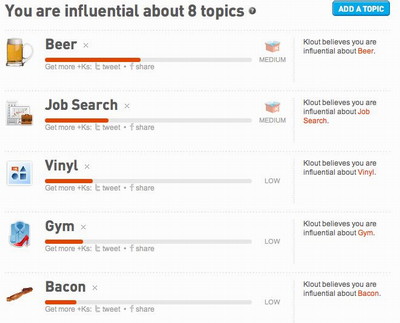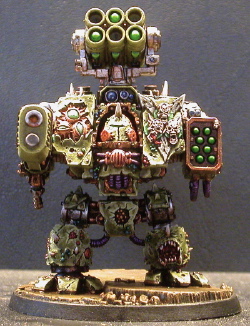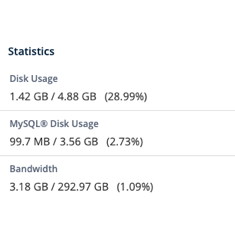Writing for GoogleJuice VS Klout
January 21st, 2012
Much digital ink gets spilled writing about Google’s ever changing search engine algorithm, but lately some folks have been starting to consider how they can increase something other than their GoogleJuice. Klout fancy themselves “The Standard of Influence”. Just like Google they have an algorithm that measures, ranks, and assigns a numerical score. Unlike PageRank which measures a webpage’s importance, Klout’s score measures a person’s influence online.
Update May 2018: Klout will no longer be running as a standalone service. You’ll just have to go back to obsessing over your Twitter and Instagram follower counts again. Me, I’ve got the most followers on WeChat because I’ve lived in China too long.
Your Klout score can definitely be gamed. Klout even provides incentives to game the system in the form of “perks”. Klout is heavily weighted towards Twitter, other social networks and web services have been added, but based on my experience what you Tweet greatly affects the topics over which you have influence. I’ve been experimenting with search engines for as long as they’ve been online. I also was an early observer and experimenter with Klout, they even gave me a badge.

Klout Score VS PageRank
There is more to Google’s search algorithm than just the original PageRank mathematical formula. Google supposedly considers over 100 200 factors when ranking a web page. Klout also gives everyone who requests one a mathematical score measuring their influence online. They consider more factors than just the number of followers you have on Twitter, but like Google they try to keep their algorithm a secret. However, both Klout and Google releases tidbits, hints, and advice to keep onlookers interested and to generate media coverage. Klout and Google also have official blogs devoted to providing insight.
Besides assigning a score to people, Klout also classifies them based on their opinion of how that person uses social media. There is a lot of fluctuation in this classification, at least in my case. Currently I am a “Networker”. If you want to increase your Klout score you simply have to link and participate in multiple online social networks. If you are active on social media your score will reflect that. Not all online social networks are created equal, Twitter seems to be the most important and frequency seems to be much more important than quality as far as the Klout algorithm is concerned.

Klout Score VS Klout Topics
Klout also measures what you’re influential about. This seems to be of more interest to advertisers and marketers. Anyone can lookup whether Conan O’Brien has more Twitter followers than Jay Leno or whether Coke has more Facebook fans than Pepsi. Television ratings have long measured how many people watch a TV show and even some basic demographic information like age and sex. Television ratings however are aggregate data and anonymous. In 2012, social media usage patterns can tell an advertiser a lot more about a person than just age and sex. Klout is the opposite of anonymity. People opt-in to using Facebook or the even more public Twitterverse and blogosphere. Sharing your information with Klout is basically enabling them to spy on you, rank you and to sell that information to advertisers. To make the transaction even more commercial, Klout may reward you with perks.

Not everyone is a celebrity with their own TV show or a nationally syndicated column. So achieving a raw Klout score comparable to anyone in traditional media will be hard for a mere blogger. However being influential about a specific topic is much easier. Unfortunately for Klout it is also easier to game these topics and what you Tweet about especially the hash tags you use is extremely important.
Search Engine Optimization VS Share-ability
SEO best practices are pretty well established now, though many still claim to have secret esoteric insights and influence over Google and the other major search engines. I’ve been asked many times to write guides or best practices:
- Some older search engine optimization advice
- My Top 10 SEO Tips
- 10 Keys to Blogging Fame and Fortune
Keyword density and correct usage of HTML tags are unlikely to be a factor in Klout’s algorithm though they’ve long been suspected of being staples of search engine algorithms. To increase your Klout you need to think about share-ability. What you write/Tweet has to be something other people will share, repeat/retweet, comment upon, or at least laugh at. This post is not very shareable. It is too long, isn’t cute or about celebrities, it isn’t even about tech that the average consumer cares about such as smart phones. If you want to increase your Klout score you have to remember people spread awesome, they don’t spread “meh”.
Repetition
The single most important factor to increase your Klout score or your influence on a single topic is repetition. Note my “bacon Klout”. I’ve never blogged about bacon. I’ve never posted anything on Facebook about bacon. There are no pictures of bacon on my Flickr photo stream. I don’t subscribe or comment on any bacon blogs. My bacon Klout comes exclusively from making bacon Klout jokes on Twitter.
This whole blog post is a result of a series of Tweets between myself, Dennis Pang, and someone at Unbounce. Dennis and I demonstrated how easy it was to gain and maintain bacon Klout. Your Tweets don’t have to be insightful as long as they are frequent and use the correct hashtag you will gain Klout for the topic that corresponds to that hashtag. You don’t need to use any other social networks. You don’t need to worry about quality. You don’t need a blog. It does help if someone retweets and responds though, so you definitely need some followers.
I’ve had influence over topics according to Klout that I have no interest in whatsoever. I’ve traced this “Klout” back to a single retweet or even just a comment on someone else’s tweet. This could be potentially embarrassing but luckily if you only do it once and while your “Klout” will only be temporary. I’m not sure how much longer I’ll have “Vinyl Klout” for instance, maybe annually on record store day.
Choosing a Topic

You can’t have Klout about a topic people and by people I mean potential advertisers don’t care about. Klout doesn’t waste much time measuring information they don’t think has commercial value. Note my complete lack of Nurgle Klout. I use different social networks for different purposes. I try to be professional but not take myself too seriously on Twitter. However in Google one thing I and Muschamp.ca are known for is miniature painting, particularly painting Nurgle Chaos Space Marines. I haven’t had a lot of time or energy for this hobby the last few years, but I’ve put up and have maintained a web page since long before Klout or Twitter or Facebook were even ideas in their founder’s head. People all over the world read and discussed my painting tips and techniques. Strangers have come up to me and known who I was based on seeing pictures of my models online and recognizing them in person at conventions. Advertisers and companies contact me about adding links to their websites from my hobby site. Yet Klout’s algorithm has never noticed. Klout doesn’t care about Nurgle.
Blogger and WordPress.com are now part of Klout’s algorithm so eventually I think Klout will notice some of my hobbies and interests as I regularly comment on other people’s hobby blogs. Currently you can only include a single WordPress.com blog you contribute to and zero self-hosted WordPress blogs. So this post and 100s of other posts, indeed this entire domain which I’ve maintained for over a decade does not have much of an impact on my Klout score. I do sometimes tweet links to things I’ve written here but I don’t do that automatically, relentlessly promoting my own content. I also share some of my posts with my friends on Facebook, but my lack of focus and my decision to write about unpopular topics doesn’t help my Klout score.
The 140 Character Limit
A lot of early critics of Twitter did not like the 140 character limit, so much so Twitter eventually doubled the character limit. The limit does result in too many acronyms and extremely dubious grammar. What it does promote is brevity, the soul of wit. It is also easier to decide what 140 characters is about, much easier than it is to determine what a web page or even worse an entire domain is about algorithmically. My lack of focus has hurt my PageRank, Klout score, even my career, but the 140 character limit definitely helps Klout and likely contributes to why Twitter is the most important network in their algorithm. Facebook has more members but most of the conversation and sharing is out of public view, whereas product recommendations on Twitter are visible to everyone.
If you want to maximize your Klout score you don’t have 140 character available. You have closer to 120 characters. Basically you have one sentence or phrase. This is another reason to keep blog post titles short and punchy. Cramming keywords into the title tag is so 1990s. You need a title that quickly encapsulates your idea, if it is keyword rich, even better. You have about 100 characters to convey your main idea. You need 20 or so characters for the URL and a hashtag to make it even easier for the Klout algorithm to know what topic you’re tweeting about. The rest of the 140 characters you need to leave blank so that people who want to retweet you and thus vote for your content and increase your influence, have room to include “RT” and your Twitter handle. This will help you receive the maximum benefit and Klout from your tweets.
More on Klout
Here is some more advice on how to be a better user of Twitter and here is some advice on how to become a blogging authority. Finally I’ve been increasing my collection of writing for social media advice.
Maybe the solution to my employment woes is to increase my Klout score. I have job search Klout, not a lot of good it has done me. The Wired article I just linked to concludes with this:
Over time, I found my eyes drifting to tweets from folks with the lowest Klout scores. They talked about things nobody else was talking about. Sitcoms in Haiti. Quirky museum exhibits. Strange movie-theater lobby cards from the 1970s. The un-Kloutiest’s thoughts, jokes, and bubbles of honest emotion felt rawer, more authentic, and blissfully oblivious to the herd. Like unloved TV shows, these people had low Nielsen ratings—no brand would ever bother to advertise on their channels. And yet, these were the people I paid the most attention to. They were unique and genuine. That may not matter to marketers, and it may not win them much Klout. But it makes them a lot more interesting.
I definitely prefer to follow real people on Twitter rather than brands. I “like” the odd brand on Facebook, but if they get annoying, I un-like them in a hurry. Finding the right post frequency and just the right amount of repetition is an art as much as a science. Sadly Klout seems to reward volume at the expense of insight and Quality.
Klout is no more but GoogleJuice and online influence remain so if you have some influential thoughts you can leave them below. Me I’m still trying to blog better.
This entry was originaly posted on , it was last edited on and is filed under: Advice and tagged: Influence, Klout, Social Media.





I just realized Klout doesn’t take into account Pinterest, for shame. Maybe they should hire more Singaporean programmers, hell maybe they should hire me. ;-)